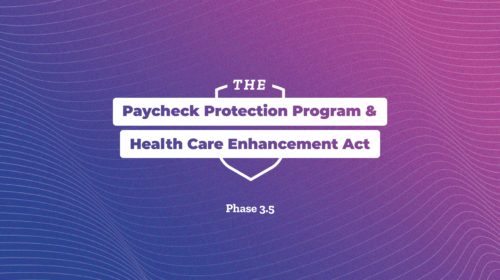Paycheck Protection Program & Health Care Enhancement Act Details

The latest coronavirus funding bill, officially known as H.R. 266 “Paycheck Protection Program and Health Care Enhancement Act,” was signed by President Trump on Friday, April 24, 2020, after being passed by the House and Senate earlier last week.
The $484 billion legislation adds dollars to existing programs that have either run out of money or are considered underfunded. It increases funding for the Paycheck Protection Program (PPP), Economic Injury Disaster Loan (EIDL) program, including emergency grants, and includes new hospital and health care funding as well as additional testing.
The bill is divided into two sections, Division A: Small Business Programs and Division B: Additional Emergency Appropriation for Coronavirus Response.
Division A: Small Business Programs
Specifically, the division increases the authority for (1) the Paycheck Protection Program, under which the SBA may guarantee certain loans to small businesses during the COVID-19 pandemic; and (2) advances on emergency economic injury disaster loans made in response to COVID-19. The division also expands eligibility for such disaster loans and advances to include agricultural enterprises.
Approximately $310 billion will be used to refresh the Paycheck Protection Program, which offers forgivable government-backed private loans, provided companies retain their workforce.
Of the $310 billion, approximately $60 billion will go to small lenders including community banks, credit unions, and community development financial institutions with assets ranging from less than $10 billion up to $50 billion.
PPP loans of up to $10 million to cover eight weeks of expenses do not have to be paid back if at least 75% of the money is spent on rehiring and keeping employees. Otherwise, the loan comes with a 1% interest rate and must be repaid within two years
An additional $60 billion will be added to the Economic Injury Disaster Loan (EIDL) program, of which $10 billion is to be used for Emergency EIDL grants.
The EIDL offers loans of up to $2 million to companies with fewer than 500 employees. This money can be used to pay off debt, provide payroll, and pay other bills. One of the main attractions of the EIDL program is the Emergency EIDL grants where a company can receive an up-to-$10,000 ($1,000 per employee) forgivable loan advance on an EIDL loan within three days.
Division B: Additional Emergency Appropriation for Coronavirus Response
This division provides FY2020 supplemental appropriations for the Department of Health and Human Services (HHS) and the SBA in response to COVID-19.The supplemental appropriations are designated as emergency spending, which is exempt from discretionary spending limits.
The appropriations to HHS for the Public Health and Social Services Emergency Fund, include:
- $75 billion to reimburse health care providers for health care related expenses or lost revenues that are attributable to the coronavirus outbreak. This includes funding to provide diagnosis, testing, and care to individuals; and
- $25 billion for expenses to research, develop, validate, manufacture, purchase, administer, and expand capacity for COVID-19 tests to effectively monitor and suppress COVID-19.
Specified portions of the $25 billion for COVID-19 testing are allocated to:
- states, localities, territories, and tribes;
- the Centers for Diseases Control and Prevention;
- the National Institutes of Health;
- the Biomedical Advanced Research and Development Authority;
- the Food and Drug Administration;
- community health centers;
- rural health clinics; and
- testing for the uninsured.